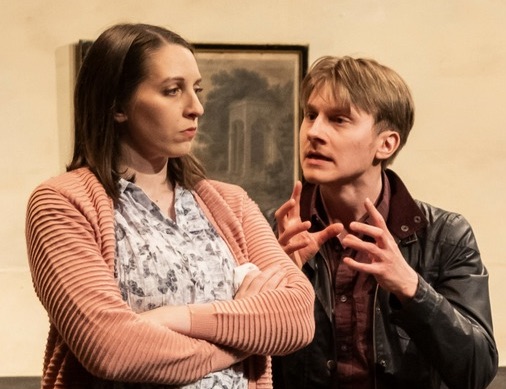Brian Friel’s The Freedom of the City feels more like a patchwork of scenes and ideas than a fully realized script — but it’s passionate, some of the writing is transcendent, and this production from Vital Spark Theatre is solid.
Set in Londonderry, Northern Ireland in 1970, the script takes its inspiration from an event called Bloody Sunday. On January 30, 1972, 10,000 demonstrators took part in a peaceful but illegal protest against the British government’s practice of imprisoning suspected members of the IRA without trial. British paratroopers opened fire on the crowd, killing 13. A fourteenth died later. In April of 1972, after an inquiry, the British government released a report exonerating the British troops.
Playwright Friel took part in the Bloody Sunday demo and, in The Freedom of the City, he presents a similar, fictional inquiry. Tear-gassed in a demonstration, three civil-rights protesters seek refuge in the nearest building, which happens to be the Guildhall, or town hall, and they find themselves in the mayor’s office. Lily is the impoverished mother of eleven, Michael an unemployed accountant, and Skinner a young lad with no fixed address.
Friel is concerned with perspectives and mythmaking. In his script, time jumps around. The play’s first image is of Lily, Michael, and Skinner’s bodies: they’ve been shot by the soldiers. After their deaths, balladeers romanticize their sacrifice in song. Before their deaths, the military and news media label this trio of ordinary folks as a band of armed terrorists — possibly forty strong — who have occupied the Guildhall in a deliberate act of provocation.
I’m going to talk about the things in the script that don’t work before I discuss the things that do.
When Lily, Michael, and Skinner arrive, they’re seeking refuge. Why they hang out in the mayor’s office as long as they do is a bigger question — that goes unanswered, which is a problem. In the office, these three don’t have goals, they’re not trying to do anything, so the core of the play is strangely flat. Yes, they’re getting to know one another, sometimes in a friendly way, sometimes with suspicion, but that’s not enough. Once the air clears, why don’t they try to get out? Once they realize that troops are surrounding the Guildhall and they’re in serious trouble, why don’t they call somebody to say they’re unarmed? There’s a phone right there: they use it to make prank calls, but not to save their lives.
The framing device of the inquiry includes testimony from an American sociologist, who explains the mindset of the underclass. What she says about the inheritance of despair and distrust of authority makes sense, but it added nothing to the understanding I came in with.
Other parts of the script are much more successful. At the top of Act 2, Lily, Michael, and Skinner each get a monologue in which they describe the moment of their death. Strikingly, their use of language in these speeches is poetic rather than colloquial. Realizing that she has never really engaged the potential of her existence, Lily says, “In a way, I died of grief.”
And that grief accumulates on other fronts. Michael, who has faith in the fairness of the system, insists on the importance of “dignified” demonstrations, while Skinner, who is an orphan, takes a more revolutionary position. When they realize they’re surrounded by tanks and armed soldiers, the tension between these two ramps up. Overall, the presentation of brutally enforced inequality adds up to a persuasive cry for justice.
In director Joan Bryans’s production, I question the decision to go with a realistic box set. Artistically, it’s not an interesting choice, especially since the company doesn’t have the resources to credibly present the luxury of the place. More successfully, Jack Mosher’s lighting and Joshua Osborne’s sound are dramatic.
And, under Bryans’s direction, the performances from this large amateur company are impressively consistent. Isaac Andrew does solid amateur work as Michael. Especially in the later going, Geneva Perkins’s performance as Lily moved me. And, in his ability to capture nuance, Liam McCulley impressed me as Skinner. Because he is so good at understatement and has a distinctive look, McCulley could do well in film and TV as well theatre.
Largely because of problems with the script, this production of The Freedom of the City isn’t consistently engaging but, when it gets there, it delivers.
THE FREEDOM OF THE CITY by Brian Friel. Directed Joan Bryans. On Thursday, May 9. A Vital Spark Theatre production running at the Jericho Arts Centre until May 19. Tickets and information
PHOTO CREDIT: Geneva Perkins and Liam McCulley (Photo by Nancy Caldwell)






0 Comments